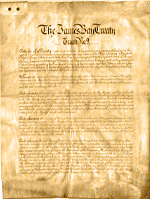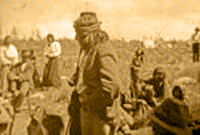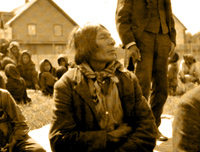Treaty 9 History - Aboriginal Cree Perspective
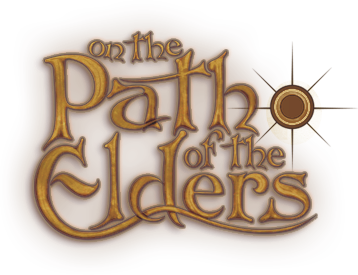
"Kih-chi-itwe-win"
(The Great Declaration or Word)
The James Bay Treaty also known as, "Treaty Number 9" was signed in 1905 between various Anishinaabe (Northern Ojibway) and Mushkegowuk (Northern Cree) bands and the governments of the day (Dominion of Canada and the Province of Ontario). Since 1905, there has been differing perspectives about the way treaty was brought, communicated and "negotiated" with the peoples.
In this essay, we provide the Anishinaabe and Mushkegowuk view and understanding of the treaty. We also provide a “window” into the lives and living conditions of our peoples at the time of the treaty signing.
Chapter 4B - 3
These are examples of oral history in the form of memories and stories passed down by our peoples who witnessed or heard of the Treaty process as the Treaty Commissioners traveled throughout our villages. My point is that our people have memories, an oral history that has been passed down about the treaty signing and the verbal promises that were made, and what the government had said to our people.
In the end, our peoples decided to sign the treaty and according to the government, gave up a vast territory of approximately 130,000 square miles of land. We also promised to be peaceful, law abiding citizens with other First Peoples and if we encountered strangers in our land, to leave them untouched. Our peoples signed Treaty No. Nine, also known as the James Bay Treaty in 1905.
I am sorry to have written so much about our peoples and the Treaty. But I wanted to make sure you had enough background information for a very good understanding, in plain language, of the history, the peoples and the governments, leading up to 1905.
As well, I wanted you to know that our Elders in 1905 did the best they could for us living today. Our Elders secured our education, protected our hunting, fishing and trapping rights, and ensured health care. Do you think they did a good job? I think they did an amazing job by maintaining our traditional lifestyle in the Treaty and today the governments are learning that, on behalf of our Elders, we’re holding them to this.
Today, because of the discovery of the Treaty Commissioners’ diaries and their written admissions about how they reassured our people that they weren’t giving up the land, we know now they deceived our people and we now know the written Treaty did not represent our understanding.
We believe the governments of the time are responsible for the manner in which the Treaty was poorly negotiated, improperly explained, and written without our input or consent. We are now telling the present governments that we believe our peoples never agreed to give away vast tracts of our land as well as the resources. From the Elders oral history we see that they talked about sharing the land and resources and they expected the newcomers to do the same. Remember, I said earlier that sharing and reciprocity was our land-based philosophy and tradition during the fur trade with the Hudson’ Bay Company and we expected the government to follow in this tradition.
We know our Elders always believed, and negotiated with each other on oral terms, commitments and promises. This was always the Cree and Ojbway style of inter-personal relations with each other and with other First peoples. We know that giving or taking up of land was never explained to them. Therefore, we also see in the Treaty diaries how the commissioners failed to see our Elders intelligence and concluded that a full explanation of what our people were agreeing to could not or was decided not to be explained. Duncan Campbell Scott: “They were to make certain promise and we were to make certain promises. But our purpose and our reasons were alike unknowable. What could they grasp of the pronouncement of Indian tenure which had been given by the law lords of the Crown.” (p58). This meant the government held back the idea of taking the land whenever it suited their needs.
I hope now that you have a good understanding of the Treaty and our peoples so that you will be able to enjoy and play the role-playing games with ease.
Chapter 4B - 2
“This is what they said. That the government was now taking us as his own children and he told us about this promise, that as long as the sun shines that he would think of his promise and that as long as the rivers flow his promise would be carried. For certain we know that the biggest promise he made was to have the sick go, those that are sick to go to the hospital, that the government would pay for them and take care of them. They also said that they would allow the children to attend school in the future” (Elder Rev. Eliezer Beardy, interviewed 1974 at Muskrat Dam) (ibid)
“When the representatives came to our village in Big Trout Lake to sign the Treaty with our leaders, we were promised that our traditional activities would be protected. They did not say that we would be regulated in the future. We were promised that our land and people would be protected the treaty protects our God given right in this land. We were never informed that the laws and regulations would be passed by the government to rule over us" (Elder Moses Fidler, interviewed 1974 at Muskrat Dam) (ibid)
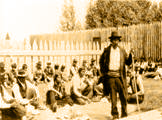
Blind Chief Missabay addressing the assembly before the feast held after the James Bay Treaty signing ceremony, Osnaburgh House, July 12, 1905.
In 1957, Elder David Sutherland (Treaty signer) at Winisk (Peawanuck ) was interviewed about whether the treaty as he understood it meant they surrendered their land in exchange for support replied, "No we did not. We do not personally know because we were never clearly told. We were told the government would look after us, support us at all time and not deceive us. They told us this so we would readily agree. It was said that the money received from the government would never run out as long as the sun shines… and you will be given four dollars every summer” (Elder David Sutherland in Long 1995:27).
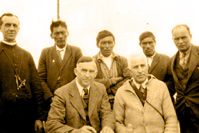
The signing of the Treaty at Winisk, Ontario. Left to right, standing: Father Martel, Indians John Bird, Xavier Patrick and David Sutherland, Dr. O'Gorman and J. Harris, H.B. Co. Post Manager. Seated: Commissioners Walter C. Cain and H. N. Awrey. July 28, 1930.
So, as you can see our Elders had a very clear idea that the Treaty meant sharing of the land and resources and not surrender as was written into the Treaty. Finally, I would like to share with you one last statement from Elder Hosea Wynne, as it is a plea to you, the young people of today:
"We regret this on behalf of our grandfathers. Many times we, the Elders, discuss this and we tell the young people of today. But they do not believe, just like the government doesn’t believe. There are too many worldly pleasures the young people are involved in. Things come from the government, even things that are not good. It allows them these things. These are the things that are distracting today's youth. They think it makes them happy. What our grandfathers said is forgotten, because of those things that come from the government. But we don’t forget.
I will not forget, for as long as I live. But I don’t know what it will be like in the future, if what our grandfathers passed on to us will be kept, or will it be lost” (Elder Hosea Wynne in Long 1993: 7)
Chapter 4A - 3
The Anishiinaabe and Mushkegowuk People's view of Treaty No. Nine
To summarize, our people knew that more and more non-aboriginal peoples were coming into our lands. At times we came across them in the bush while we were hunting and trapping. Our peoples saw signs that the animals were being trapped on our lands, sometimes from poisoned bait that was never used by our people. As well, the fur trade was ending and so we wanted our lands, trap-lines, and animals to be protected. We wanted our hunting, fishing and trapping rights to be secured in an agreement with the government. We also wanted monetary help, schools for our children and to know that we would not be interfered with in our traditional lifestyles on the land and waters.
In our culture, we did not keep written records. But our stories and knowledge was verbally passed down through generations of families, extended families and ancestors. So, our word is very important and we even have a word that refers to verbal formal promises as Shatamakaywina that we used amongst ourselves as well as to refer to the Treaty (Long 1995: 27; Spence 2008: personal communication).
Our oral history is very important to us for it is the main medium to describe and record events, occurrences, and news that are spread throughout the community so that the context and information is communicated to many people.
Just like written history, the oral history of our peoples reflects the way they understood the treaties. Even those who were just born at the time of the signing of Treaty No. Nine, or many years later, often learned of the events later in life as the story was passed down by parents, grandparents and Elders about what had took place. And we believe our peoples because their word was always trusted and it is the one thing that we hold to be true and accurate.
You see as the treaty was being explained to our people, we did not understand English, so it had to be translated to us. And those that translated, usually Hudson’s Bay Company interpreters or missionaries, may not have explained and translated everything properly. So, in many cases, our oral understandings of the treaty show that what was discussed and agreed to by our peoples, was not reflected in the written treaty. This is the view of our Elders at the time. Elder John Fletcher, from Moose Factory who was born in 1889 and witnessed the Treaty No. Nine signing described it this way:
“The Commissioners came, representing His Majesty, the King of England, and said, ‘We have brought to you his Majesty’s request to surrender your land, to act as a custodian, and if you respond to this request, you will be given money for every year. You will also be given assistance by His Majesty the King. Your children will be educated. The government will pay all expenses. You will not pay for medication. The government will pay for the treatment of your illnesses’” (Nishnwabe-Aski Nation 1986: 36).
John also said another person asked one of the Treaty Commissioners, "Will our hunting be affected by the Treaty?" The Commissioner answered, "This hunting right will never be taken away. Do you see this river that never stops flowing? This Treaty will be an example to it" (ibid). Elder John Fletcher even said they were told that they would share in the resources and the wealth that would be found in our homelands. "Although this was not written in the Treaty, these kinds of verbal promises were considered by us before we signed the Treaty" (ibid). According to John, they were told, "Nothing will ever alter your way of life. We will share this land with your people. You will not lose your culture if you sign this treaty" (ibid). Many years later before John’s death, he reminisced, “It seems to me, as a witness to the signing of the Treaty, that some of these promises have been forgotten” (ibid).
At Fort Hope, Chief Moonias, concerning the benefit of money to his people said, "Ever since I was a little boy I have to pay well for everything, even if it was only a few pins or a bit of braid, and now you come with money and I have to give nothing in exchange” (Macklem 1997: 112).









